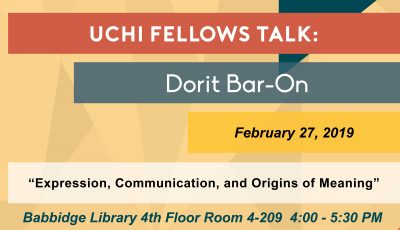

1. Tell us a bit about the project you are working on at UCHI.
We humans are not the only minded creatures in the world. Nonhuman animals, too, can have various affective and cognitive states of mind. But (as far as we know) we are the only creatures who speak their mind. The question of interest to me is how that could come to pass. My project is a philosophical investigation into the origins of linguistic meaning, integrating conceptual tools and theoretical insights from linguistics, comparative psychology, biology of communication, and cognitive science (among other fields).
2. What drew you to this topic and what exciting developments are you anticipating?
I have always been interested in language – its nature and structure, and its connection to mind. In more recent years, having learned about extensive research into animal communication, I became interested in continuities and discontinuities between nonhuman animal communication and human language and the time-old question of how language could have evolved from animal communication.
3. What are you looking forward to in regard to this year at UCHI?
I am planning to complete a manuscript in progress titled Expression, Communication, and Origins of Meaning
4. Many people wonder what value the humanities and humanities research has in today’s world. What are your thoughts on what humanities scholarship “brings to table?”
Based on my experience of talking to people from diverse disciplines over the past 10 years, I see the kind of thinking cultivated in the humanities – broad yet detail-oriented, integrative, attentive to connections of ideas and similarities in patterns of thought – as immensely useful no matter the discipline or inquiry. Humanists’ common intellectual practice of ‘standing back’, taking stock, and adopting a broader perspective can have a transformative effect on any field of research.

